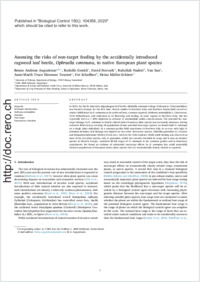Assessing the risks of non-target feeding by the accidentally introduced ragweed leaf beetle, Ophraella communa, to native European plant species
- Augustinus, Benno Andreas University of Fribourg, Department of Biology, 1700 Fribourg, Switzerland - CABI, 2800 Delémont, Switzerland
- Gentili, Rodolfo Dipartimento di Scienze dell'Ambiente e della Terra, Università di Milano-Bicocca, 20126 Milano, Italy
- Horvath, David University of Fribourg, Department of Biology, 1700 Fribourg, Switzerland
- Naderi, Ruhollah Department of Crop Production & Plant Breeding, School of Agriculture, Shiraz University, Shiraz, Iran
- Sun, Yan University of Fribourg, Department of Biology, 1700 Fribourg, Switzerland
- Tournet, Anne-Marth Truce Eleonoor University of Fribourg, Department of Biology, 1700 Fribourg, Switzerland
- Schaffner, Urs CABI, 2800 Delémont, Switzerland
- Müller-Schärer, Heinz University of Fribourg, Department of Biology, 1700 Fribourg, Switzerland
-
21.06.2020
Published in:
- Biological Control. - 2020, vol. 150, p. 104356
English
In 2013, the North American oligophagous leaf beetle, Ophraella communa LeSage (Coleoptera: Chrysomelidae), was found in Europe for the first time. Recent studies in Northern Italy and Southern Switzerland record extensive defoliation by O. communa on its preferred host, common ragweed, Ambrosia artemisiifolia L. (Asteraceae, Tribe Heliantheae), and reductions in its flowering and seeding. In some regions in Northern Italy, this has reportedly led to a > 80% depletion in airborne A. artemisiifolia pollen concentrations. The potential for non-target damage by O. communa to closely related native European plant species was previously unknown. During extensive field surveys covering 18 populations of nine potential non-target species, we found adult O. communa on a single plant individual. In a common garden field experiment in Northern Italy in an area with high O. communa densities, leaf damage was highest on two other Asteraceae species, Dittrichia graveolens (L.) Greuter and Pentanema helveticum (Weber) D.Gut.Larr. (both in the Tribe Inuleae). While adult feeding was observed on most of the test plant species, only D. graveolens, which has recently extended its range and is now an invasive species in Western Europe, sustained all life stages of O. communa in the common garden and in laboratory experiments. We found no evidence of substantial non-target effects by O. communa that could potentially threaten populations of European native plant species that are taxonomically closely related to ragweed.
- Faculty
- Faculté des sciences et de médecine
- Department
- Département de Biologie
- Language
-
- English
- Classification
- Biological sciences
- License
-
License undefined
- Identifiers
-
- RERO DOC 329397
- DOI 10.1016/j.biocontrol.2020.104356
- Persistent URL
- https://folia.unifr.ch/unifr/documents/308824
Statistics
Document views: 163
File downloads:
- pdf: 341
